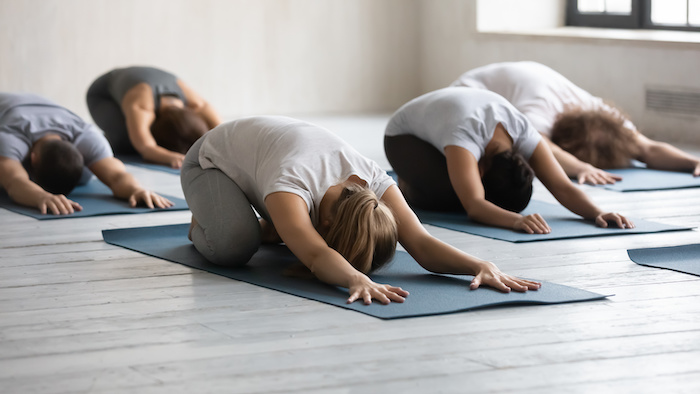
We want to be your partner in doing just that—let us help you take the steps towards a better night’s sleep. Keep reading for our top tips and tricks for perfecting your slumber.
Mindfulness
One of the most difficult, yet rewarding challenges a human being can ever face is learning how to master their own mind.
Mindfulness is the act of learning mental discipline, which teaches us to recognize negative or non-serving thought patterns. Upon recognition, mindfulness helps us to learn how to redirect our thoughts into something more positive or productive.
Practicing mindfulness helps you recognize thought patterns that are negative or making your situation worse. Use positive self-talk, mantras, or breathing techniques to help you calm down and relax. Focus on breathing, relaxing, and calming your thoughts before drifting to dreamland to encourage productive sleep.
Try the 4-7-8 Breathing Technique:
- Breathe In Slowly Through Your Nose for Four Seconds
- Hold Your Breath for Seven Seconds
- Exhale Through Your Mouth for Eight Seconds
- Repeat This Process Four Times
Many people find this mindfulness technique incredibly effective and claim to fall asleep within minutes by focusing on and controlling their breathing.
Meditation
Mediation is a powerful practice that has been used for thousands of years for various disciplines throughout history. People apply meditation techniques for many practical reasons such as developing clarity of mind, stress-relief, and patience.
However, the benefits of mediation can include lowering your blood pressure, improving digestive functions, and helping with depression and anxiety. Some people have even mastered the art of meditation for pain relief, healing, and transcendence.
Not surprisingly, meditation is also a fantastic tool for improving your sleep quality. Meditating helps trigger the relaxation response in your body, which is the opposite of the fight-or-flight response. Aside from reducing stress and anxiety, meditation also helps you break through your daily thought patterns—many of which keep your mind active while you’re trying to fall asleep.
Once You Get Settled Into Bed Every Night, Complete a Sleep Meditation Ritual:
- Lay Flat on Your Back, Legs Hip-Width Apart, and Put Your Hands on Your Stomach
- Focus on Your Breathing, Noting Your Airflow and the Movement of Your Stomach Rising and Lowering
- Allow Thoughts to Come in and Out of Your Mind but Don’t Linger on Them—Return Your Attention to Your Breathing
- Beginning With Your Feet, Focus on Relaxing
- Slowly Work Your Way up the Rest of Your Body While Focusing on Letting Go of Tension and Stress
- Once Again, Allow Thoughts and Emotions to Come and Go With Ease, Returning Your Focus on Relaxation
- After You’ve Completed a Complete Body Scan, Return Your Focus to Your Breathing
- Count Your Breaths Up to Ten or Focus Solely on Just Breathing Until You Fall Asleep
This simple practice helps relax your body and mind from long, stressful days. The key is to not fall into thought patterns that will keep you awake. This includes planning for tomorrow, replaying events from your day, or engaging in self-criticism.
Yoga
Since our bodies were made to be active, regular exercise can keep us healthier and even improve our sleep.
Yoga provides a good balance between strength and flexibility. When you practice yoga, your body releases endorphins, which are natural feel-good hormones. These hormones reduce pain, stress, anxiety, and depression—all of which contribute to sleeplessness.
Because yoga requires physical and mental exertion, those who practice yoga experience better sleep efficiency, more deep sleep, and less sleep disturbance throughout the night.
A Yoga Pose for Better Sleep

- Start by Kneeling Down in the Center of Your Yoga Mat or on a Soft Surface
- Bring Your Feet Together (Big Toes Touching)
- Pull Your Knees to the Sides of the Yoga Mat
- Breath In Deeply
- Exhale Slowly and Lower Your Torso Down to Your Thighs
- Push Your Arms Behind You Alongside Your Torso With Your Palms Facing Upward
- Let Your Shoulder Blades Relax and Widen
- Let Your Forehead Rest on the Mat in Front of You
- Slowly Rotate Your Head Back and Forth
- Focus on Breathing In and Out of Your Nose
This is one of the many fantastic yoga poses to perform right before bed to help your body and mind relax. Each pose should be held for two to three minutes, focusing on your breathing.
Nutrition
Practicing good nutrition habits will not only help keep your health in tip-top shape but it can also prevent restless nights. If acid reflux keeps you up at night, try to ensure your last meal is consumed at least three hours before bed. Additionally, foods high in vitamin B can improve melatonin production in your body, which is a hormone that regulates your sleep cycle.
You’ll also want to try and consume foods containing tryptophan, magnesium, amino acids, and protein.
Here Are Some Great Choices:
- Honey
- Oats
- Lean Meats (Turkey, Chicken, Fish)
- Almonds
- Bananas
These foods will help encourage a restful night’s sleep by helping you wind down and relax all while regulating your sleep hormones. Similarly, you’ll want to avoid foods that inhibit sleep, such as heavy foods, spicy foods, alcohol, sugar, and anything with caffeine.
Has your sleep quality been negatively impacting your life? If you suffer from fatigue, lack of focus, anxiety, depression, or irritability, it could be from sleep deprivation.
However, taking this time to improve your sleep through practicing mindfulness, meditation, or yoga is a leap forward towards a good night’s rest. Now is the perfect time for a relaxing slumber that can translate to many years to come!




